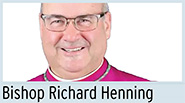 On the 50th anniversary of his priestly ordination, then Pope John Paul II described every vocation as a “gift and mystery.” The late Holy Father’s words provide a lens into the origin of every priestly vocation.
On the 50th anniversary of his priestly ordination, then Pope John Paul II described every vocation as a “gift and mystery.” The late Holy Father’s words provide a lens into the origin of every priestly vocation.
Career aspirants rarely find “the priesthood” listed at job fairs, and with good reason. One does not become a priest from personal choice alone, as if the priesthood were one option among many. The genesis of every priestly vocation belongs to God. At his ordination, every priest receives a totally unmerited and gratuitous gift that does not originate in himself.
Instruments for the divine plan
Such a noble inheritance does beg the question, however: Why priests? Couldn’t the omnipotent God effect His saving work without them? He certainly could. But the very Author of salvation, who orders all things toward their proper end, chooses instruments to carry out His divine plan. Students of theology need look no further than the dogma of the Incarnation to reinforce this axiom.
St. Thomas Aquinas teaches us that nothing obligated the Son of God to take on human flesh. The Incarnation belongs to fittingness, not necessity. What better way could God prove His mercy for us, than to hand over His only begotten Son, whose perfect sacrificial oblation to the Father signifies the love of one who lays down his life for his friends? A fitting reason, indeed, for in Jesus, we have access to God.
After Philip wishes to see the Father in the Gospel of John, Jesus retorts, “Have I been with you for so long a time and you still do not know me, Philip? Whoever has seen me has seen the Father” (Jn 14:9). Jesus, who is God, gives us access to the Father. In many ways, the priest continues this divine mirroring in time.
Sacrificial fatherhood
Through his configuration to Christ, the priest shares in a most noble transmission of divine paternity for a world in need of authentic fathers. Fathers lead, protect and provide for their families. But what distinguishes an authentic father from a fraudulent one is his willingness to sacrifice – to give himself entirely for his bride and his family.
Priestly fathers are no different. When he offers the sacred species of bread and wine on the altar, the priest doesn’t explain what Christ did. Rather, he effects Christ’s saving work in his very person, uttering not “This is His body,” but rather “This is My body.”
The divine election of every priest thus serves to continue God’s saving work through the gift of self. The man who receives this gift can only turn in gratitude to the God who makes him a bridge between heaven and earth. He will never grasp the fullness behind his divine election, especially because of his personal unworthiness. But the mystery at the heart of every vocation does give a priest a renewed opportunity for wonder and awe. God has done this, not him. His response is in imitation of the Master: “How shall I repay the Lord for His goodness to me? The chalice of salvation I will raise” (Ps 116:12).
The Church begs the Lord to open the ears of these men He has predestined to serve at His altar, so that they might hear His voice and open wide the door when He knocks. The inheritance that awaits these men belongs to the mystery of a God who never ceases to give.
Bishop Richard G. Henning, D.D., S.T.D., is the Bishop of Providence, Rhode Island.
Beyond our own happiness
 “While a vocation does bring us joy and should be something that we are good at, it is not primarily concerned with either of these things. As the word indicates, a vocation – from the Latin vocare, “to call” – is something that comes from outside and for the sake of something other than ourselves.
“While a vocation does bring us joy and should be something that we are good at, it is not primarily concerned with either of these things. As the word indicates, a vocation – from the Latin vocare, “to call” – is something that comes from outside and for the sake of something other than ourselves.
Against the values of the world that tell us to never do anything we do not like and to think of our own happiness first, someone with a vocation is concerned most with the needs of the caller rather than their own, willing to sacrifice their own immediate happiness and comfort for the sake of the call.
For them, there is a mission much greater than themselves at stake and they are willing to do whatever it takes to fulfill it. Sometimes, this means accepting that what we want to do and what we are good at is not what the world needs.”
— Franciscan Father Casey Cole in “Called: What Happens After Saying Yes to God”


